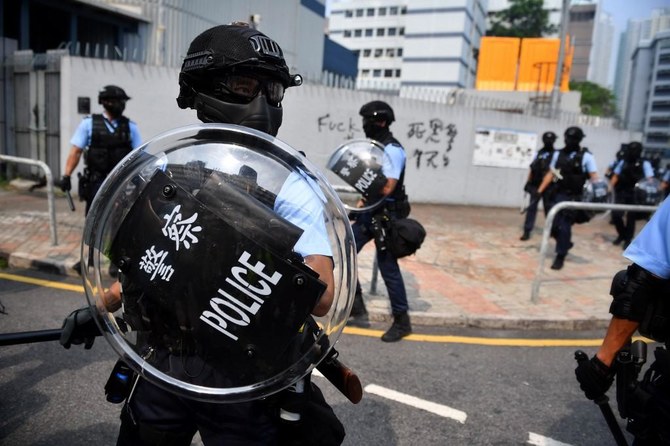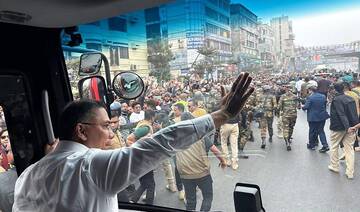HONG KONG: Prominent democracy activists were arrested Friday in a dragnet across Hong Kong — a move described by rights groups as a well-worn tactic deployed by China to suffocate dissent ahead of key political events.
The sweep comes after a major rally planned by a civil rights group on Saturday was banned by police on security grounds.
Hong Kong has been locked in three months of political crisis, with increasingly violent clashes between police and protesters that have prompted an escalating public relations campaign from China.
Protesters had planned yet another mass rally on Saturday — the fifth anniversary of Beijing’s rejection of a call for universal suffrage in the semi-autonomous city.
It was a pivotal moment, sparking the 79-day Umbrella Movement in 2014, which seeded the ground for today’s protests.
But organizers on Friday afternoon said they would not march, complying with the police banning order.
Earlier, two of the Umbrella Movement’s leaders, Joshua Wong and Agnes Chow — both still well-regarded among the city’s youth — were arrested in dawn swoops both accused of “inciting others to take part in unauthorized assembly” among other charges.
The pair were charged in court on Friday afternoon. The main charge carries up to five years in jail.
Hours before another vocal independence campaigner Andy Chan was detained at Hong Kong’s airport.
The arrests are a sign of the “spread of ‘white terror’ toward Hong Kong protesters,” said Issac Cheng of Demosisto party, co-founded by Wong, deploying a commonly-used term for China’s efforts to fragment and harass the protest movement.
More than 850 people have been arrested in connection with protests since June.
But that has failed to snuff out the leaderless protest movement.
Chan’s small independence party was outlawed last year on the grounds it posed a national security threat, the first such ban since the former British colony returned to Chinese rule in 1997.
A fourth pro-democracy campaigner, Rick Hui a councillor for the working-class Sha Tin district, was also detained by police on Friday, according to a post on his Facebook page, without detailing why.
Former student leader Althea Suen was also arrested for entering parliament building during a July break-in by protesters.
Amnesty International decried the “the ludicrous dawn swoops,” condemning the arrest of Wong and Chow as an “outrageous assault on the rights to freedom of expression and peaceful assembly” and as “scare tactics straight out of Beijing’s playbook.”
The arrests come as Hong Kong’s crisis-hit government scrambles to find an appropriate response to the unprecedented pro-democracy protests, which have by turns seen millions march, closed the airport and left city streets strewn with bricks and shrouded in tear gas.
The protests started as a kickback against a bill allowing extraditions to mainland China, but quickly billowed out into wider calls for democracy and police accountability.
Permission for another mass rally on Saturday was denied on security grounds, raising the likelihood of another weekend of clashes between police and protesters.
In a letter to rally organizers the Civil Human Rights Front (CHRF), police said they feared some participants would commit “violent and destructive acts.”
After an appeal to hold the rally was rejected, Bonnie Leung of the avowedly peaceful CHRF said “no option but to cancel the march tomorrow.”
But pockets of protesters swiftly vowed to hold creative events at the scheduled time and place of the rally, including a mass shopping trip, football match and impromptu religious gatherings in downtown Hong Kong, while a YouTuber with 800,000 followers called a fan meeting.
With a hardcore minority among the protesters, mainly young students, unlikely to heed the police ban, the weekend appeared poised for renewed violent clashes.
Student protester Kelly, who wanted to be identified only by her first name, said the arrests would not cow the movement.
“The police think there are leaders behind the protests and this will stop us,” she said.
“We are our own leaders and we will keep coming out.”
On Sunday the city saw some of its worst clashes, with running battles between black-clad protesters, armed with bricks and Molotov cocktails, and police wielding batons, rubber bullets and tear gas.
One officer fired a warning shot — believed to be the first live round used during the protests — as a mob with sticks set upon several policemen.
The violence has damaged Hong Kong’s reputation for stability and prosperity.
China has responded with a campaign of intimidation, with a slick PR video released Thursday showing troop movements into Hong Kong as part of “routine garrison rotation.”
State-media reported that fresh Chinese military anti-riot drills were held across the border in Shenzhen.
Businesses in the financial hub — from airline Cathay Pacific to the city’s metro operator — have also been squeezed by Beijing for harboring apparent supporters of the pro-democracy movement.
Cathay sacked several staff over the protests after China’s aviation body banned pro-democracy supporters among the carrier’s staff from its airports and airspace.
On Friday the airline went further, threatening to sack any staff who join a scheduled two-day strike next week.
Protesters say freedoms in the semi-autonomous city, unique within China, are being eviscerated by Beijing.
Under the terms of the 1997 handover deal, the city has rights and liberties unseen on the mainland, including an independent judiciary and freedom of speech.
Hong Kong police round up activists as mass rally called-off
Hong Kong police round up activists as mass rally called-off

- The city demonstrators have been rallying for three months
- Two leaders of the Umbrella Movement were among the ones arrested
Bangladesh’s religio-political party open to unity govt

- Opinion polls suggest that Jamaat-e-Islami will finish a close second to the Bangladesh Nationalist Party in the first election it has contested in nearly 17 years
DHAKA: A once-banned Bangladeshi religio-political party, poised for its strongest electoral showing in February’s parliamentary vote, is open to joining a unity government and has held talks with several parties, its chief said.
Opinion polls suggest that Jamaat-e-Islami will finish a close second to the Bangladesh Nationalist Party in the first election it has contested in nearly 17 years as it marks a return to mainstream politics in the predominantly Muslim nation of 175 million.
Jamaat last held power between 2001 and 2006 as a junior coalition partner with the BNP and is open to working with it again.
“We want to see a stable nation for at least five years. If the parties come together, we’ll run the government together,” Jamaat chief Shafiqur Rahman said in an interview at his office in a residential area in Dhaka, days after the party created a buzz by securing a tie-up with a Gen-Z party.
Rahman said anti-corruption must be a shared agenda for any unity government.
The prime minister will come from the party winning the most seats in the Feb. 12 election, he added. If Jamaat wins the most seats, the party will decide whether he himself would be a candidate, Rahman said.
The party’s resurgence follows the ousting of long-time Prime Minister Sheikh Hasina in a youth-led uprising in August 2024.
Rahman said Hasina’s continued stay in India after fleeing Dhaka was a concern, as ties between the two countries have hit their lowest point in decades since her downfall.
Asked about Jamaat’s historical closeness to Pakistan, Rahman said: “We maintain relations in a balanced way with all.”
He said any government that includes Jamaat would “not feel comfortable” with President Mohammed Shahabuddin, who was elected unopposed with the Awami League’s backing in 2023.














